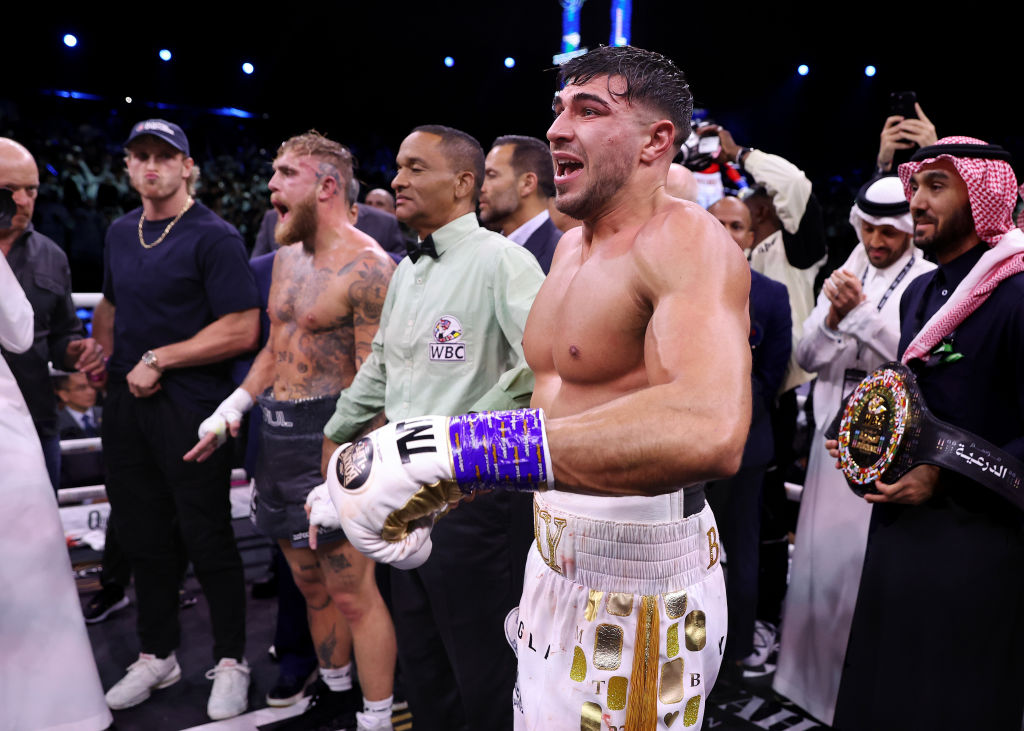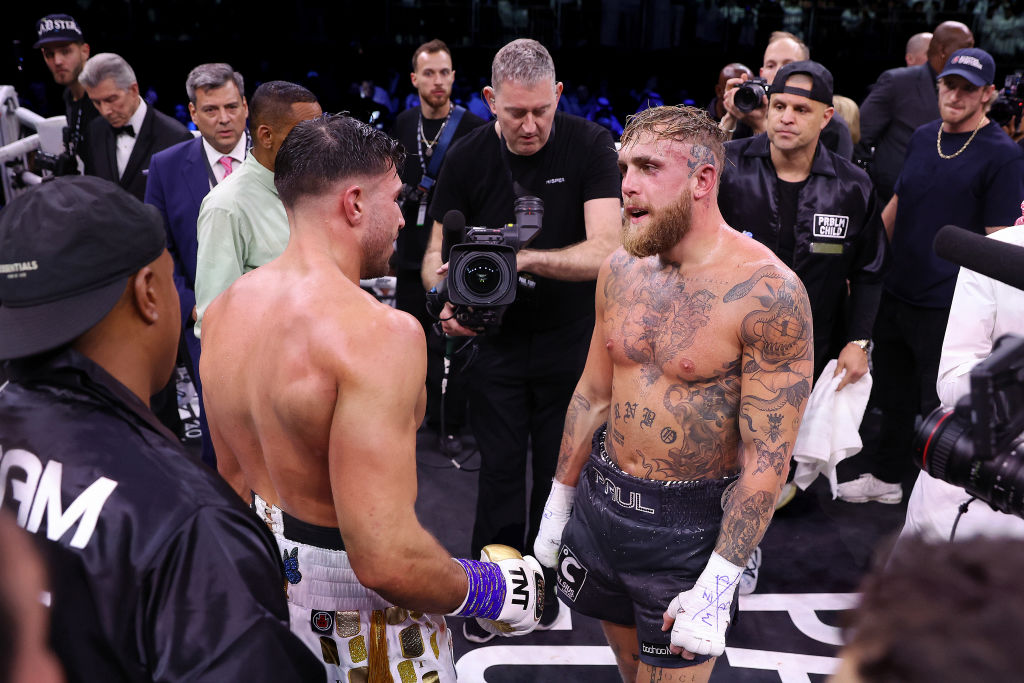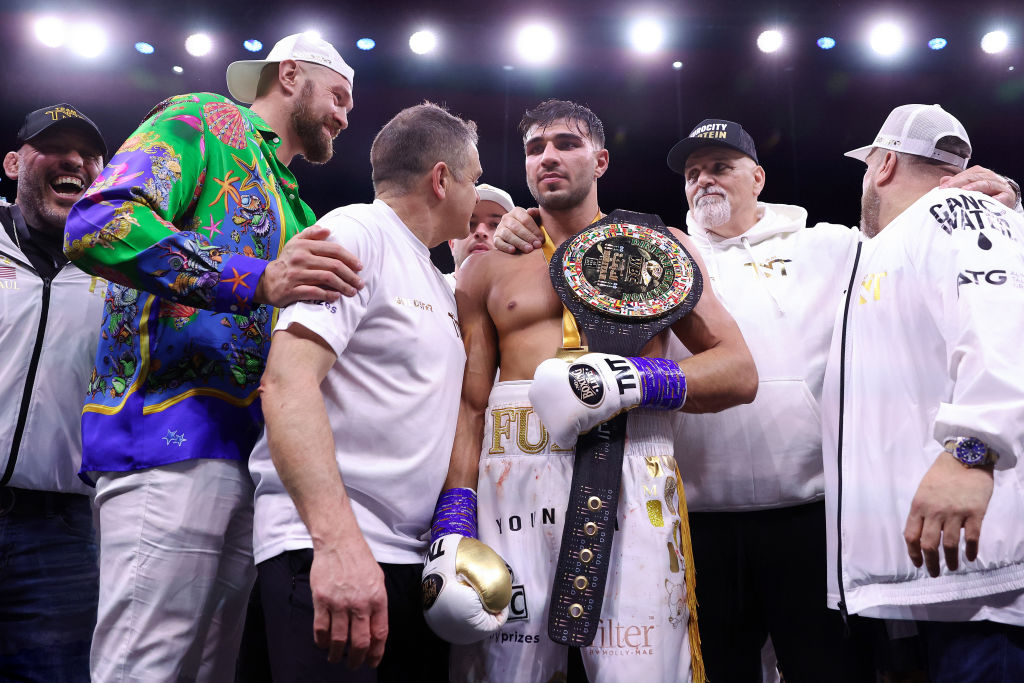To put what happened under the lights in Diriyah, Saudi Arabia, simply: Tommy Fury beat Jake Paul by split decision. As is often the case with boxing these days, attention soon turned to whatever the judge who scored the fight in Paul’s favour was smoking, but regardless the bout was over, the result sealed, and Paul himself had only muted protests to the fact that Fury won.
“All respect to Tommy, he won,” Paul said immediately afterwards. “Don’t judge me by my wins, judge me by my losses.”

Tommy Fury celebrates as the result declares them the victor as Jake Paul looks dejected after the Cruiserweight Title fight between Jake Paul and Tommy Fury at the Diriyah Arena on February 26, 2023 in Riyadh, Saudi Arabia. (Photo by Francois Nel/Getty Images)
Stoicism in defeat aside, and despite his disappointment, Paul must have known, more broadly, that he, too, was victorious. Everyone who had anything to do with that fight walked away better off than they had been before it took place.
Fury took the victory, got paid (£3.7m on the night, potentially rising to £10m by 2025), and found fifteen minutes out of the shadow of his brother and missus. Paul went the distance with a purportedly professional boxer and enhanced his reputation in doing so, setting himself up for another payday come the rematch. The fighters’ brothers – Tyson and Logan – each had a laugh in the desert, got plenty of screen time and surely pocketed something from someone. Frank Warren had his greasy mitts all over it in the way boxing promoters do. ESPN, YouTube, TikTok, Twitter, Instagram etc. will have all seen an influx of traffic.
Then there’s boxing itself, which – say what you will about the legitimacy of the fight – will have attracted millions of young fans, many of whom will return. Because the fans also won; after a back-and-forth between Paul and Fury for years, the fight finally materialised and gave people the competitive contest they were after. Which just leaves the little old Kingdom of Saudi Arabia, who successfully hosted (on the same day their state-owned football club competed in a major final for the first time in over 20 years) a global event with barely a murmur of sports-washing. The largest gulf state continues to establish itself as a lucrative sporting destination with only a faint penchant for stoning people and butchering dissident journalists.

RIYADH, SAUDI ARABIA – FEBRUARY 26: Tommy Fury speaks with Jake Paul, after Tommy Fury defeats Jake Paul during the Cruiserweight Title fight between Jake Paul and Tommy Fury at the Diriyah Arena on February 26, 2023 in Riyadh, Saudi Arabia. (Photo by Francois Nel/Getty Images)
Anyhow, boxing has long been about big-name, big-money bouts. Decades on, people remember Ali vs Foreman and The Rumble in the Jungle, Ali vs Frazier and The Thrilla in Manila, Mike Tyson and Evander Holyfield, parts one and two, to just name a few.
More recently, the Mayweather and Pacquiao superfight fetched hundreds of millions, the trilogy between Canelo and GGG saw two pound-for-pound greats lock horns across 36 rounds, while Fury and Deontay Wilder’s trilogy reignited the heavyweight division and confirmed Tyson’s place among the all-time heavyweights.
Of course, Fury vs Paul was never going down in that pantheon. Nor did it pretend to. It served a different purpose and knew how to perfectly play its role. The fact remains, however, that the prerequisite of genuine boxing ability is no longer necessary in staging a big fight. While both Fury and Paul showed determination, athleticism and flashes of their ability to box, that was all secondary to the fact they are both well-known social media personalities with a convenient rivalry.

Tommy Fury celebrates as they pose for a photo with their Title Belt, coaching team, brother Tyson Fury and father John Fury after defeating Jake Paul during the Cruiserweight Title fight between Jake Paul and Tommy Fury at the Diriyah Arena on February 26, 2023 in Riyadh, Saudi Arabia. (Photo by Francois Nel/Getty Images)
That everybody wins is not necessarily a bad thing. That both men can walk away with their faces, reputations and – hopefully – long-term brain health intact should be celebrated, and this slightly less violent form of boxing actually makes it more accessible. It just needs to be contextualised. To try and pretend this is elite sport is a slap in the face to the countless boxers who train day in, day out to fight far more dangerous fights in front of comparatively paltry audiences for comparatively paltry sums.
“This to me is a world title fight. It was my destiny,” Fury said afterwards. That’s all well and good. It’s clear what it meant to him and I’m happy he won. He just needs to stop blagging the professional boxer narrative, and own the fact he’s a succesful entertainer with the world of social media at his feet… much like the other guy.




